Chickens are awesome to raise, they don’t take much effort, and they provide you with plenty of benefits. Not only will they give you eggs for breakfast, meat for lunch, and a good cash flow if you choose to breed them, they also make fantastic pets, they’ll clean up your backyard, and keep your soil healthy with their manure. If you are thinking about raising chickens, here are some tips.
The Benefits of Raising Chickens
Raising chickens has several benefits outside of meat and eggs, here are some of them:
Fertilizer
Chicken manure is a very popular fertilizer due to its natural fertilizing capabilities. It works wonders in vegetable gardens because it’s full of phosphorous, potassium, and nitrogen.
Pest Control
If you live in an area with disease-spreading insects such as ticks and mosquitos, chickens will help cut down their population. Additionally, these bugs are good for chickens and contain the nutrients required for healthy eggs.
Waste Reduction
Although you can’t feed chickens everything, they will eat whatever kitchen remains are good for them. So instead of throwing leftovers in the trash, give them to your chickens.
Gardening
Chickens will have your garden looking brand new all the time! If you raise free-range chickens, they’ll peck all day and get rid of any weeds.
Different Chicken Breeds
The chicken breed you decide upon will depend on your reason for keeping them. As a homestead, I am assuming its for meat and eggs, but in general, people keep chickens for the following reasons:
- As pets
- Meat and eggs
- For exhibitions and showings
Here are some of the most common breeds for meat and eggs:
- Wyandottes: These chickens lay up to 240 brown eggs annually; they weigh around six pounds and have a good flavor.
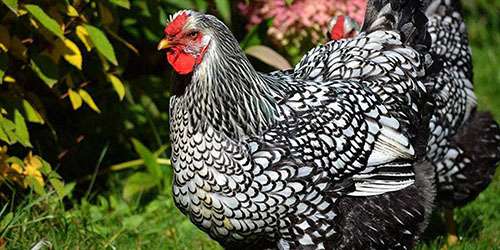
- Orpingtons: These chickens lay up to 200 brown eggs a year, they are heavy birds and can weigh over 10.5 pounds.
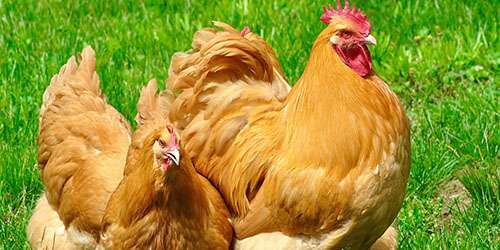
- Brahma Roosters: They are one of the largest chicken breeds weighing between 10 and 12 pounds. They lay around 200 brown eggs a year, and they thrive in cold climates because of their heavy feathering and size.
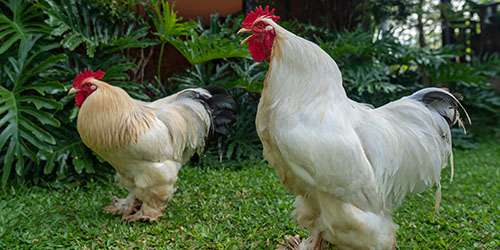
- Ixworth Chickens: They lay around 240 eggs a year and weigh about 7 pounds making them good table birds.
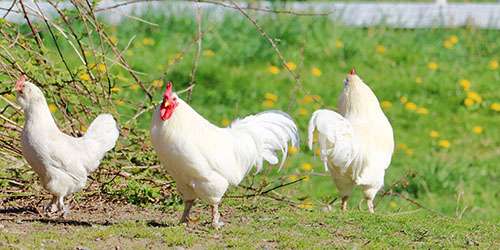
- Cochins: This is another heavy bird, averaging around 10 pounds in weight. They are extremely feathery meaning they will survive during harsh winters.
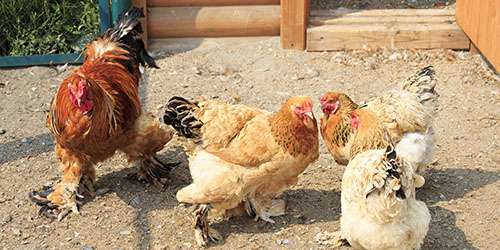
- Transylvanian Naked Necks: These chickens don’t have any feathers around their necks. They are immune from most diseases, weigh up to 8.5 pounds and lay an average of 200 brown eggs a year.
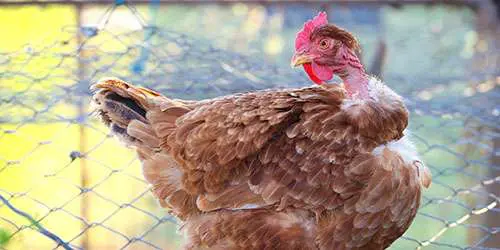
How to Feed Chickens
Feed your chickens a balanced diet of carbohydrates, protein, vitamins, and minerals. Growing chickens need protein, and protein is also important for egg production. If a hen doesn’t have enough protein in her diet, you’ll notice a drop in her egg production. A free-ranging hen will find protein because they forage for meaty insects such as snails, slugs, and worms. But if your hens are not free-ranging, they’ll need a feed that will give them all the right nutrients. Depending on the age of your chickens, they’ll need the following type of feed:
Chicks
Up until the age of 5 weeks, feed them chick crumbs, they’ll get around 19% of their daily protein requirements.
Pullet
Between the ages of 6 to 18 weeks, chickens will need food that will match their growing needs. Give them ‘growers mash’, it contains approximately 16% of their daily protein requirements.
Laying Hens
Your chickens will need a feed called, ‘layers pellets’ once they start laying eggs. It contains approximately 16% protein and will help with their egg-laying.
Foods to Feed Your Chickens
Store chicken feed in metal dustbins, this will keep it dry and safe from rodents. Here are some foods you should feed your chickens:
- Grit: Grit is probably the most important food for chickens. Chickens swallow their food whole because they don’t have teeth, they need grit for two functions, to help grind their food, and to help with the digestion process. When buying grit, choose the kind with oyster shells because they are high in calcium which will help make their eggshell strong.
- Greens and Chicken Treats: Chickens will eat the majority of things including bananas, raisins, cereals, green veggies, and pasta. You can give them treats, but not too many or they’ll be too full to eat their layers pellets.
- Corn: Corn just might be a chicken’s favorite food, as soon as they hear the sound of it, they come running. Corn helps tame chickens; nevertheless, mixed corn contains a lot of fat, so one handful of corn per hen is enough.
Foods Not to Feed Your Chickens
Chickens will eat anything on the menu, but there are certain foods that they absolutely should not eat. Here are some of them:
- Raw or Dried Beans: Kidney beans are the worst, but any uncooked beans will kill your chickens very quickly. They contain phytohaemagglutinin, which is a deadly toxin for poultry. As little as three beans will cause severe illness, and this will progress to death within an hour.
- Moldy Foods: The mold that grows on apples, corn, and nuts is called aflatoxin, this is a toxic substance known to contribute to liver cancer in humans and animals.
- Avocado: Avocados provide great health benefits for humans but not for animals. Avocados carry a toxin called persin which causes heart problems in birds. After consumption, they’ll start having breathing difficulties and die within 48 hours.
- Green Tomatoes or Green Potatoes: Green tomatoes and potatoes carry toxins called chaconine and solanine. They are found in the sprouts, flesh, and peel of potatoes. Unripe tomatoes and any part of a potato where green is found are not good for your flock. It will cause lethargy, paralysis, and then death.
- Chocolate: The two ingredients in chocolate that are harmful to chickens are caffeine and theobromine. Even in small amounts, they can cause heart problems in birds that lead to cardiac arrest, and then death within 24 hours. Feeding your chickens chocolate sounds like a nice treat, but you’ll literally kill them with kindness!
How Much Food do Chickens Need?
Chickens are always eating, so you’ll need to make sure they’ve got enough food to last them until bedtime. An adult chicken eats plenty of layers pellets, and they’ll need about 120 grams per day. Make sure their feeders are always topped up with this amount. Also, if they’re free-ranging, you might want to have two feeders, one inside and the other outside their coop run. This will ensure that the less dominant chickens get the food they need.
How to Protect Chickens From Predators
You are not the only person who loves chickens, they’ve got plenty of admirers including rats, hawks, snakes, badgers, weasels, coyotes, raccoons, and foxes to name a few. Domestic chickens are easy prey because they don’t have very strong survival skills. Therefore, you need to make your chicken coop as safe as possible. Here are some tips:
- Secure Fencing: Make secure fencing your first priority; chicken wire will prevent chickens from escaping, but it won’t keep out a determined badger or fox. You can get around this by adding a hardware mesh to the fence, or you can drag a thin trench around the coop and put rammed earth or enviroblocks in place to stop predators from digging. You can further enhance security by doing the same to the floor of the coop. If there are bears in your area, it’s advised that you embed electric fencing into your hardware mesh.
- Lock up at Night: It’s important to lock your chickens up at night to ensure their safety. It is also important to use a locking device that predators won’t be able to unlock. A carabiner or a weatherproof lock works well.
- Secure Roof: Keep your chickens protected from above and below because owls and other flying predators can easily swoop into a coop and scoop up your chickens! A metal roof will deter predators because a slippery surface will be difficult for predators to grip hold of. A hardware mesh over the roof will also keep predators out.
Final Thought
You’ll have plenty of fun raising chickens, apart from the benefits mentioned above, they’re cute and entertaining, and they each have their own unique personalities. As long as you feed your chickens properly, and keep them safe from predators, you’ll have a consistent supply of meat and eggs to feed your family.
You may also like:
When You Should Eat Roadkill And When You Should Not
Cheap and Easy to Build Root Cellar in Your Own Back Yard (Video)
Livestock Animals You Should Start Raising For The Upcoming Economic Crisis
How To Attract Toads and Frogs to Your Garden (And Why You Should Do It)

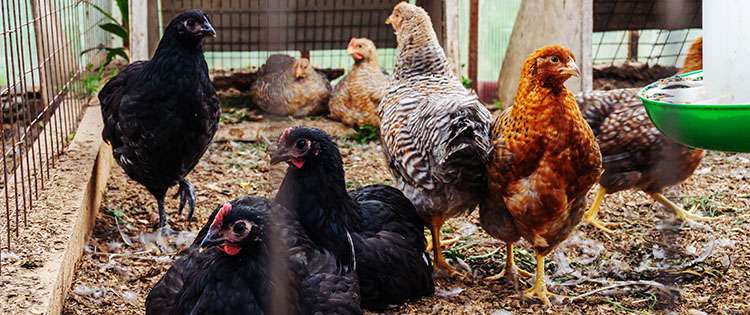
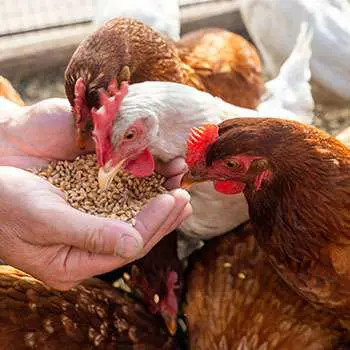
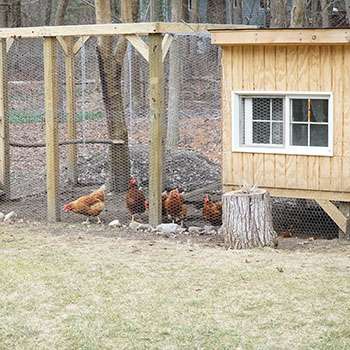








This was very helpful. Thank you.